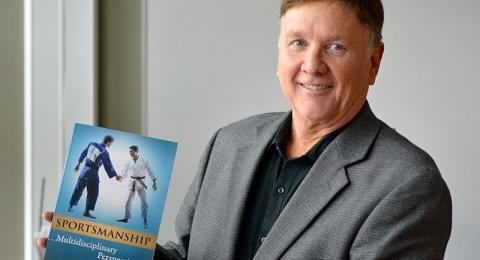Professor's new book on sportsmanship gathers wide-ranging expertise
Office of Communications and Marketing
Published
SUNY Oswego sociology professor Tim Delaney has filled what he saw as a large gap in the literature of sports studies, editing a new cross-disciplinary book on sportsmanship.
In “Sportsmanship: Multidisciplinary Perspectives,” 26 authors representing 20 disciplines and five countries provide what Delaney calls “the most comprehensive collection of essays on the meaning of sportsmanship in existence.”
Newly available from McFarland & Co., the 277-page book takes on a topic that echoes from a reader’s first recollection of a parent saying, “Be a good sport” to news stories of today that document the myriad ways athletes demonstrate just the opposite.
Among Delaney’s chapter contributors are four other faculty members from SUNY Oswego: Evelyn Benavides of sociology, publishing as Evelyn A. Clark, who takes on issues of gender and sportsmanship; Chris Mack of history, who wrote a chapter on early 20th century golfer Francis Ouimet and sportsmanship in golf; Brian Moritz of communication studies, writing about sportsmanship and sports journalism; and Stephen A. Wurst of psychology, whose chapter is on cognitive psychology and sportsmanship.
The subject is near and dear to Delaney’s heart: Trained as a sports sociologist, he recently hosted his eighth Sportsmanship Day Symposium at SUNY Oswego in honor of National Sportsmanship Day.
“Twelve to 15 years ago, National Sportsmanship Day in March came to my attention,” said Delaney, a prolific author who also recently published “The Sociology of Sport” and long has taught courses on the subject. “I’d ask my classes (about it); nobody had ever heard of it. I started finding it odd that athletes hadn’t heard about it. … That led me to, ‘Well ESPN doesn’t do anything special to highlight or honor Sportsmanship Day.’ Then you begin to realize that everybody in sports, from parents to coaches to league officials, everybody will talk about the value of sportsmanship, they’ll give lip service to it, and yet nobody actually does anything specific about Sportsmanship Day.”
Ethical behavior
Delaney also found “sportsmanship is one of these concepts where everybody supposedly knows what it is.” Yet, he learned, people from different countries and different academic disciplines had different definitions of and ideas about sportsmanship.
Also helping move along Delaney’s idea for a multidisciplinary book on sportsmanship were takeaways from the Sportsmanship Day presentations of faculty from departments such as history and psychology, as well as student presentations.
“One college student was a referee for youth soccer, and he talked about the horror of being a referee at a youth soccer game” for 8- and 9-year-olds, Delaney said. “The coaches talked a good game about sportsmanship, but the parents on the sideline were out of control, screaming at the coach to put their kids in and yelling at the referee.”
Delaney wondered: If parents aren’t teaching and modeling sportsmanship, who is? Additionally, while researching his recent book “Sociology of Sport,” he noted the paucity of literature on sportsmanship geared for adults. Examples of civility and ethical behavior—and the opposite—abound in the new collection of essays.
“How we practice sportsmanship, or don’t, gives us practical and profound insights of our contemporary society,” he said. “It’s reflective of our cultural values, ethics, attitudes and norms. … When we no longer care about sportsmanship, we’ve got far bigger problems in society.”



